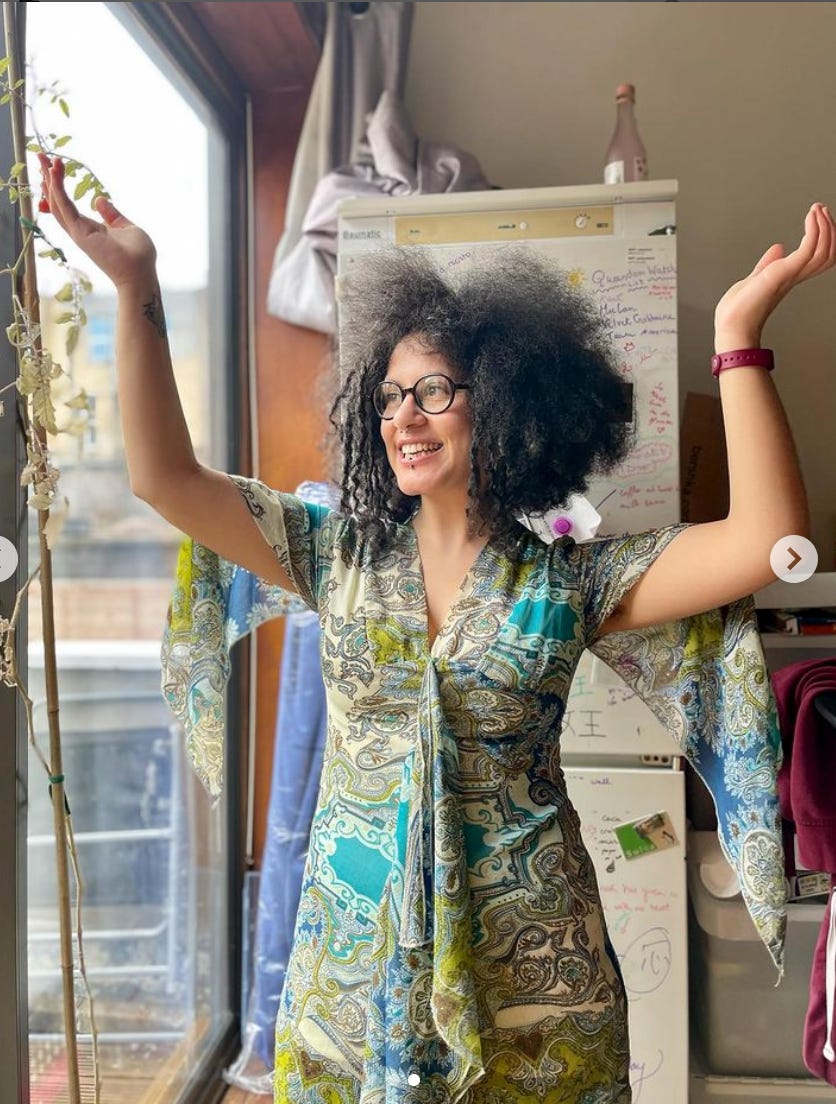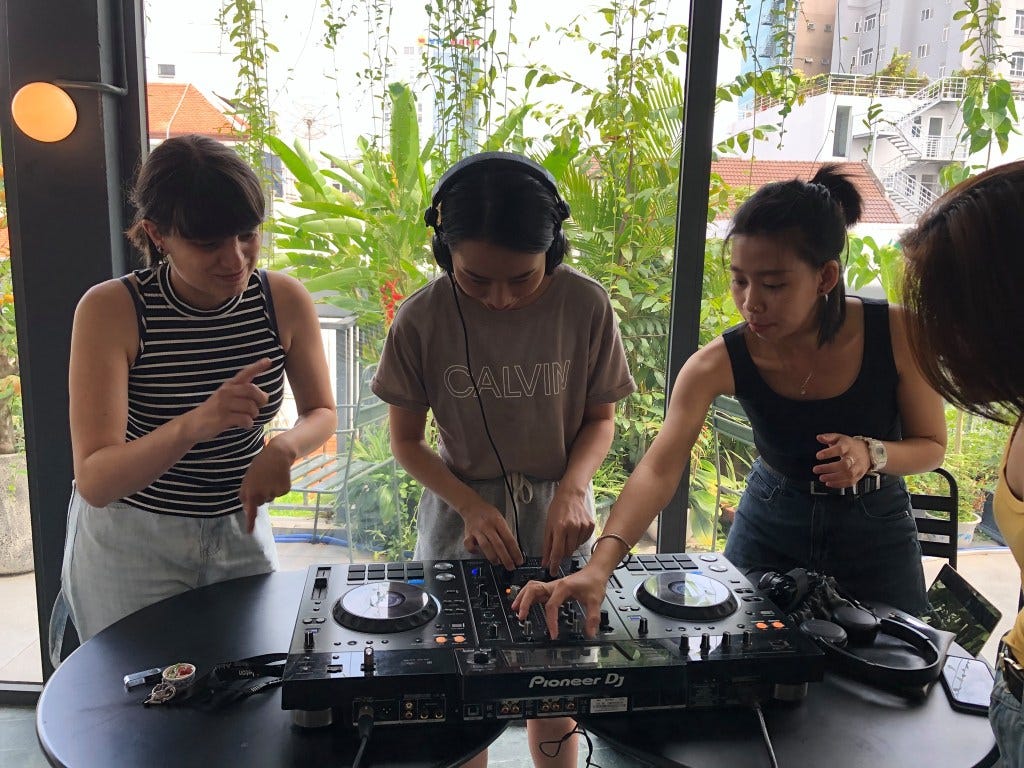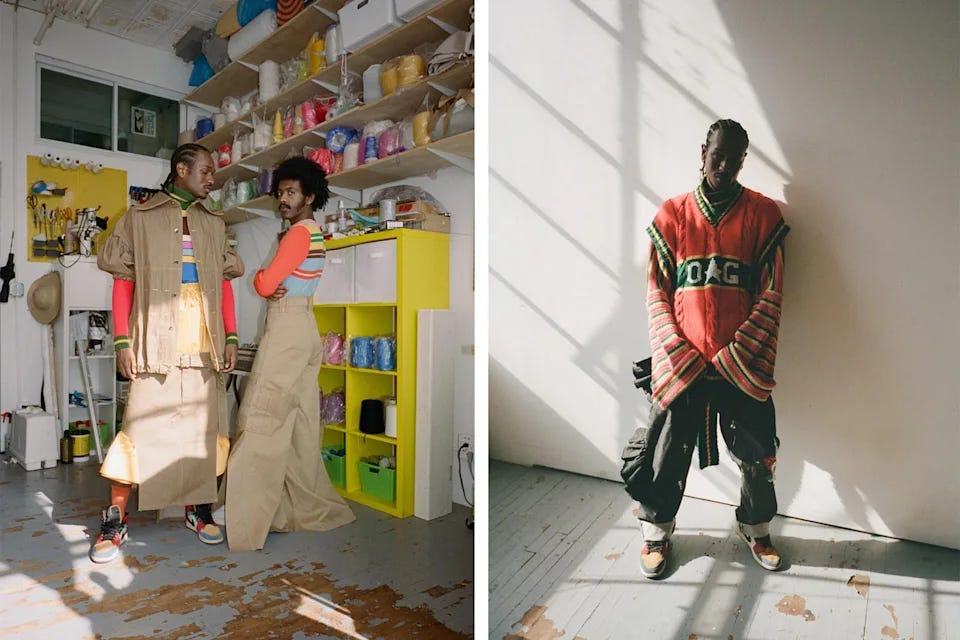Global Roundup: Dr. Strange & LGBTQ+ Activism in Egypt, Sri Lanka Women Garment Workers, Revitalizing Indigenous Birthing Practices, Vietnam Women DJ Workshops, Black Queer Designer
Curated by FG contributor Samiha Hossain
When El-Attar was 16-years-old in 2009, they were excited about a new film out in the cinemas called Bedoon Rekaba (Uncensored in Arabic), where one of the main characters was a bisexual Egyptian woman. However, El-Attar was heartbroken to see that the bisexual character exploited and preyed on desperate young women that she seduced using her financial powers, and was depicted as a cautionary tale of what children could grow up to be if they weren’t raised properly.
El-Attar compares the erasure back in her teenage years to Egypt banning Marvel's Dr Strange 2 from screening. The scene that triggered the movie’s ban is a mere 12-seconds long and shows teen superhero America Chavez, a lesbian character, referring to her parents: two mothers. Egypt requested that Disney cut the 12-second scene for Egyptian cinemas, but they refused. She notes that in the West, Marvel fans were outraged that the scene was so short, and have criticized the film for "woke washing" and using Xochi Gomez’s character as the "diversity hire" – criticism she sees as also valid.
The laws that Egypt and other countries across the Middle East use to criminalize queer people for their gender and sexual identities are mostly colonial laws introduced by the British empire.
Queerness is arguably one of the most authentically and historically Egyptian experiences there is. A painting of the two ancient Egyptian high officials, Nyankh-Khnum and Khnum-Hotep, kissing is possibly the oldest depiction of homosexuality in the world, painted some 4000 years ago. - Shrouk El-Attar
In 2012, the British government brutally raided El-Attar’s family’s home and deported the rest of her family. She was left behind alone in the UK, then later given the right to remain legally. One year after this traumatic experience, she started performing as Dancing Queer - a show she created that mixes two of the most significant parts of her identity: being queer, the art of drag, with being Egyptian, the art of belly dance. A portion of her income is donated to the LGBTQ+ community in Egypt.
When I first took to the stage, I felt empowered for the first time since arriving in the UK. I use my show as a protest against the treatment of LGBTQ+ Egyptians. It has become very successful, touring the world with countries as far as India and Japan. - Shrouk El-Attar
El-Attar recognizes that she is not alone in her activism, there are many others. The past decade has seen the rise of countless fearless Egyptian LGBTQ+ activists like New York-based Iman LeCaire, who survived a stabbing attempt by her own brother in Egypt. Today, she is the founder of the charity Trans Asylias supporting transgender asylum seekers. Though El-Attar is saddened she cannot tour in Egypt or ever feel safe in her home country, she continues to fight and remain hopeful.
Most Egyptians on the ground doing the revolutionary work of fighting for LGBTQ+ rights cannot be named, but I see you. And I can't wait for a once again tolerant Egypt to rise back from the ashes so I can loudly celebrate you. So I can say your name. So everyone can say your name. Inshallah, that day will come. - Shrouk El-Attar
Garment workers sew skirts at Timex garments factory in Wattala, Sri Lanka November 2, 2017. REUTERS/Dinuka Liyanawatte
One factory owner says he has “never seen anything like this” in his 20-year career. Due to rolling power cuts, soaring costs for raw materials, shrinking orders and a labour shortfall, he is closing his factory, which employs 20 women. Many rural, low-paid women have already lost their jobs or say they have taken on loans or extra shifts to make ends meet each month.
One luxury brand garment piece stitched in our factory is worth our monthly salary. When they earn millions of dollars off of our many hours of arduous work, we are paid little. - Charika Fernando, 22
Sri Lanka is facing its worst financial crisis since independence in 1948, with foreign exchange reserves shrinking 70% to $2.36 billion in January. The dollar shortage has left the island struggling to pay for imports including food, medicine and fuel. The government says help is on its way but shops cannot wait and some big brands have already turned to alternative markets, such as Bangladesh and India, to fill the gap.
The garment industry in Sri Lanka provides direct employment to 350,000 people and indirect employment to another 700,000. Women make up about eight in every 10 workers in the sector and most come from rural areas in search of jobs. As is the norm with the industry, these women receive low pay, work long hours, do physically demanding work in risky conditions and are not compensated for sick days.
The pandemic has exacerbated the plight of garment workers from Central America to South Asia. Thousands of garment workers faced reprisals and worked in tough conditions as COVID-19 protocols were violated and outbreaks swept through factories. Now, with Sri Lanka’s economic crisis, the situation has only compounded.
If you care about women's rights, you should worry about how the fashion business runs. [Women] are repressed not just at home, but also at work, school, and in their families. We want everyone who works in the garment industry to be paid a fair wage. - Padmini Weerasooriya, trade unionist for more than 20 years
Allie Barton is a Wolastoqey mother of two and had a pair of midwives for her children's births. (Allie Barton/Facebook)
Ellen Blais, director of Indigenous midwifery for the Association of Ontario Midwives, was part of the Sixties Scoop, where Indigenous children were removed from their homes and placed with non-Indigenous foster or adoptive parents. She sees Indigenous midwives as an important step in keeping Indigenous babies in their communities. She has spent nearly 25 years in Indigenous health care, and though she spent most of her career on the administrative side, she helped deliver 200 babies as a midwife.
Infants have been taken out of the arms of our women since residential schools and I really feel that midwifery is an intervention in that. - Ellen Blais
Indigenous midwives work to ensure Indigenous mothers have the right prenatal care and access to their nation's birthing ceremonies, helping revitalize Indigenous birthing practices. According to Blais, there are 57 Indigenous midwives in Ontario and an estimated 150 across Canada – she hopes these numbers grow.
When Allie Barton gave birth to her two children, now 15 months and three years old, she opted for care from midwives. Her midwives provided her with a birthing pool, taught her different birthing positions and offered her breastfeeding advice. They were also available by phone at any time and for six weeks postpartum care. She says her experience was so great that she wants to learn midwifery herself.
They're able to connect with you on a different level and help guide you through every stage of the labour… I think every community should have access to midwifery care. - Allie Barton
Via CoolHunting
A growing number of women DJs are paving the way for a more gender- and sexually-inclusive scene in Vietnam’s nightlife. At the forefront of this movement is Pho The Girls – a DJ workshop for women and nonbinary people presented by collective SYS Sister Sounds. The collective is empowering girls and gender nonconforming individuals to take up space in the music and club industries.
Founded by Margaret Tra, the collective and its workshops began three years ago when Tra moved to Vietnam from Brussels. Having struggled to find a woman, particularly a woman of color, to teach her to DJ when she first started, Tra knew firsthand how many barriers to entry there are in the field – from finding the right teacher to having enough money and confidence to buy equipment. Her experience inspired her to pass on what she learned to others.
I’d gone to Vietnam once every year for the last couple of years because my dad’s Vietnamese and my mom’s Cambodian. I was just like, ‘You know what, I want to go back, live in Vietnam and start SYS Sister Sounds.' - Margaret Tra
Tra’s goal continues to be to inspire confidence in women, and to place Asian voices at the forefront, especially given that Vietnamese women are not encouraged to enter creative industries.
I’ve probably taught over 100 Vietnamese women but it’s still a traditional space. My big thing was I just want to teach them that it’s possible to earn an income from being creative or being in the music industry. That’s something that I struggle with with my parents, so I can only imagine what it’s like with local, Vietnamese girls. - Margaret Tra
Tra notes that there is an outdated stereotype in the DJing industry in Vietnam where women are called “sexy DJs.” She has watched women get turned away from clubs, never getting opportunities to share music while men get seemingly unlimited chances. To break these gender barriers in Vietnam, Pho The Girls hosts intimate, inclusive workshops where everyone gets a chance to use the gear, learn to use CDJs and controllers and understand the basics. SYS also hosts other women-centred workshops on confidence, mindfulness and mental health.
As I started running these workshops, these girls have had my back. I see it in the workshops, as well. Once I teach one girl, I step back and they start teaching each other and then I can see them being there for each other, very supportive, loving and kind. Even now, they message with each other of what they’re doing, mental health check-ins and things like that—even offering each other gigs. DJing is such a competitive space sometimes; there’s none of that in this community. - Margaret Tra
Tra has also founded Hanoi Community Radio as a way to form a music space separate from the usually cliquey DJ circles and a platform where she can encourage girls to keep mixing and sharing music. More recently, she launched a music label under SYS which is releasing a new single in June. The label’s mission is multipart: promote Asian musicians, uplift Vietnamese artists, and inspire women to become producers.
jacques agbobly black boy knits fall winter new collection knits made to order accessories via Yahoo.com
Jacques Agbobly is a first-generation Togolese immigrant, who has cultivated community and Black queer joy through custom, handmade knitwear. At the height of the pandemic, Jacques Agbobly officially launched Black Boy Knits with a three-piece offering of made-to-order knits that were fully customizable in size, color and style, allowing each wearer to feel unique and seen in their BBK knit. They are now a finalist for this year's Vogue Fashion Fund in addition to being accepted into the knitwear program at Central Saint Martins.
The handmade work harmoniously melds African archetypes and queer identities, proving that self-expression does not exist in a vacuum, but rather exists as a celebration of our collective experiences. Agbobly’s work is inspired by their memories of watching tailors and seamstresses cut traditional African fabrics and patterns from inside their childhood home.
I used to spend so much time hiding under the cutting tables watching the tailors just create the most unique pieces. They were always bright, color-printed African textiles and I think that was one of those moments where I truly fell in love with fashion. - Jacques Agbobly
Agbobly launched Black Boy Knits after being tired of the performative activism from so many brands during the pandemic and witnessing so many designers of color feeling unwanted in fashion spaces.
I wanted to bring an element back into fashion where people felt empowered to be themselves and show up in something that just emphasized the parts of them that society has shunned for so long. - Jacques Agbobly
The aim of BBK’s latest collection is to highlight Black joy using bright colors and playful silhouettes while simultaneously paying homage to some of the archetypes and dress practices rooted in the Black identity from a global perspective. The first look in the collection combines two archetypes found in West African culture and Black American culture: The Nigerian Aunty and Sagging. The Nigerian Aunty archetype often is looked at as an embodiment of wealth while sagging is considered to represent something that is low-class often by non-black folks. The resulting silhouette aims to subvert the boundaries of masculinity within the Black community. Agbobly wants to move beyond the gender binary and use fashion as a tool to challenge expectations and realities.
Samiha Hossain (she/her) is a student at the University of Ottawa. She has experience working with survivors of sexual violence in her community, as well as conducting research on gender-based violence. A lot of her time is spent learning about and critically engaging with intersectional feminism, transformative justice and disability justice.
Samiha firmly believes in the power of connecting with people and listening to their stories to create solidarity and heal as a community. She refuses to let anyone thwart her imagination when it comes to envisioning a radically different future full of care webs, nurturance and collective liberation.







I am both hopeful and sad every time I read these round ups. Why humans are so small-minded baffles me, but we are evolving and I hope we manage to continue doing so, and in a more open minded direction.